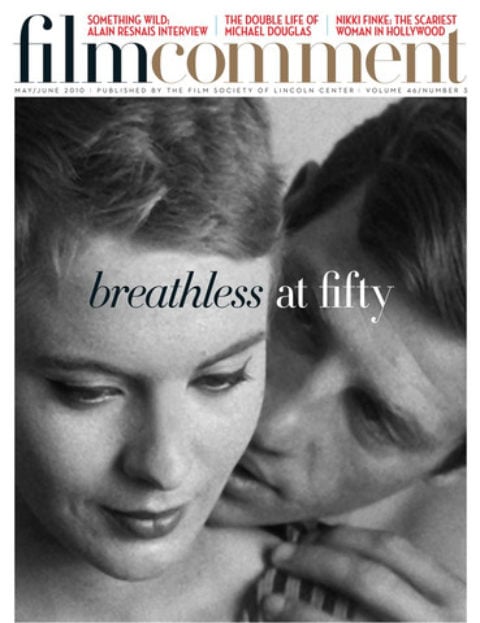
Swooping across sparkling azure waters, the first shots of Neil Jordan’s Ondine envision Ireland amid a sea bubbling with ancient mystical forces. When the camera settles on the boat of a glum-faced, scruffy-haired fisherman named Syracuse (Colin Farrell), we know sooner or later that something supernatural is bound to intrude upon his dreary routine. It finally arrives in the form of a beautiful amphibious female (Alicja Bachleda) curled in a fetal position in his net, a discovery whose strangeness the fisherman accepts matter-of-factly. As in the director’s previous cinematic homecomings, such casual acknowledgment of the world’s magical-realist capacities serves to indicate cultural Irishness—a reliance on wild Celtic imagination in the face of an unstable modernity. Once Syracuse’s young, wheelchair-bound daughter (Alison Barry) identifies his catch as a “selkie”—a half-woman, half-seal creature who can shed her original moss-clump of skin in exchange for a seven-year fling with a landsman—we are encouraged to suspend our disbelief, sit back, and wait for these unconvincingly reticent lovers to get it on.
As it becomes apparent that the eponymous fairy-tale heroine’s sole narrative purpose is to invigorate the love life of Farrell’s recovering-alcoholic single father, the film risks turning into a melodramatic and slightly artier version of Enchanted. Jordan could easily have used the film as an occasion for serving up Disney doses of whimsy, just as he bookended Breakfast on Pluto (05) with subtitled voiceovers of chirping CGI birds. But for the most part Ondine mutes the potential absurdity of its romance in favor of a stately earnestness, interrupted here and there by the ailing daughter’s precocious witticisms, a few droll exchanges with the neighborhood priest (the dependably deadpan Stephen Rea), and the occasional gratuitous ogling of Bachleda in damp undergarments. When it stops seeming merely half-assed, Ondine’s down-to-earth mysticism proves quite appealing, particularly in comparison to Jordan’s more ostentatious ventures into fantasy. Even in The Butcher Boy (97), the director’s best film, the quirkiness is always a bit overemphatic, the leaps into surrealism threatening to become empty stylistic gestures. In Ondine’s leisurely first hour Jordan refrains from weighing his narrative down with gimmicks, instead entrusting the film’s evocation of the uncanny to Christopher Doyle’s alluring but uncharacteristically restrained cinematography. Awash in dark greens and blue-grays, the film’s visual beauty locates magic within the natural landscape, but remains just murky enough to keep the characters locked in a state of metaphysical uncertainty.

Things start to go awry when we realize that the film’s emotional sensitivity doesn’t go much deeper than its moody surfaces. While Jordan has never been an incisive social critic or a reliable plumber of psychological depths, his most vivid characters—from the transgender protagonists of The Crying Game (92) and Breakfast on Pluto to Jodie Foster’s vigilante in The Brave One (07)—are embodiments of taboo, outcasts intent on asserting themselves regardless of the consequences. In his Irish-themed films, Jordan’s engagement with Celtic folklore and its fascination with shadow-selves has served as a prism through which to confront the nation’s present-day complexities and tumultuous past century. Unfortunately Ondine, whose identity is built on the same kind of dualities and contradictions, ends up standing for very little, and proves to be more of a blank-eyed cipher than even your average Disney princess. As she heals the spirit of her ne’er-do-well lover, sings pretty Sigur Rós melodies that lure the big fish into his net, and takes her place as the new maternal figure in a family torn by divorce, she represents nothing more than the self-effacing alternative to Syracuse’s negligent, liquor-swilling shrew of an ex-wife: one feminine cliché swapped for another.
As if to atone for its paper-thin characterizations, Ondine starts to overreach in its final half-hour. In a film that scrupulously underplays its mythic material, the concluding plot twist is most surprising for how much it tries to accomplish in a few brief, undercooked minutes. An abrupt plunge into genre excess, complete with a mustachioed villain and grainy slasher-film cinematography, the ending contains a blind stab at social relevance that turns the water-versus-land dichotomy into a vague metaphor for immigration and cultural assimilation in Ireland. This one false move not only erases the mythic ambiguities that enabled the film’s woozy, dreamlike pacing, but also reveals Jordan skipping across big, barely articulated questions of Irish nationhood as if they were mere stepping-stones on the way to the plot’s pathetic gratifications. In the end love has an easy time conquering all, since Jordan can’t seem to muster any curiosity about the obstacles it must overcome.








